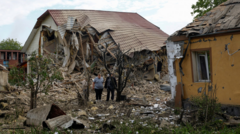**In the wake of a brief but intense military conflict, Pakistan's military expresses cautious optimism about the truce with India while addressing divergent narratives of victory between the two nations.**
**Truce Hangs in Balance as Military Dialogue Continues Between Pakistan and India**

**Truce Hangs in Balance as Military Dialogue Continues Between Pakistan and India**
**As regional tensions ease, hopes rise for lasting peace amid conflicting military claims.**
In an atmosphere of tentative stability, Pakistan's military announced on Sunday its expectations for a fragile peace along the contentious border with India following a week of ongoing communication between military leaders from both sides. The dialogue has been facilitated by direct lines of contact established in the aftermath of a four-day barrage of missile strikes and air assaults that rocked the region.
Lieutenant General Ahmed Sharif Chaudhry, spokesperson for the Pakistani armed forces, shared insights during an interview at the military’s General Headquarters in Rawalpindi. He remarked on the vital contact maintained between top commanders from Pakistan and India, underscoring that "a mechanism is in place" to manage ceasefire protocols.
The conflict reignited on May 7 when India launched strikes on Pakistan as a response to a terrorist incident alleged to be linked to Pakistan, which Islamabad has strongly denied. The situation escalated rapidly, resulting in strikes targeting military installations in both countries until the United States brokered a cease-fire agreement on May 10. During this confrontation, India reported the deaths of five soldiers, while Pakistan cited 11 soldier fatalities along with civilian casualties from artillery exchanges in the contested Kashmir territory.
In the aftermath, both nations have engaged in a war of narratives, each asserting its triumph over the other despite the truce. General Chaudhry highlighted that India executed cruise missile attacks on the Nur Khan air base near Islamabad and other locations, conversations that registered damage corroborated by satellite evaluations. However, Pakistani officials claim that the inflicted damage was minimal and that their operational capabilities remain robust.
The Pakistan military also alleged that it targeted 26 military sites in India in retaliation during the Indian strikes, although they have not released satellite evidence to support their claims. General Chaudhry further asserted that Pakistan's air force successfully downed six Indian aircraft, a statement contested by India, which has not publicly addressed any aircraft losses amidst the conflict.
"We have been very transparent—about the attacks on our bases, our loss of lives," he stated, questioning India's transparency in reporting its military losses, hinting at the complex dynamics that continue to shape relations between the nuclear-armed neighbors.
Lieutenant General Ahmed Sharif Chaudhry, spokesperson for the Pakistani armed forces, shared insights during an interview at the military’s General Headquarters in Rawalpindi. He remarked on the vital contact maintained between top commanders from Pakistan and India, underscoring that "a mechanism is in place" to manage ceasefire protocols.
The conflict reignited on May 7 when India launched strikes on Pakistan as a response to a terrorist incident alleged to be linked to Pakistan, which Islamabad has strongly denied. The situation escalated rapidly, resulting in strikes targeting military installations in both countries until the United States brokered a cease-fire agreement on May 10. During this confrontation, India reported the deaths of five soldiers, while Pakistan cited 11 soldier fatalities along with civilian casualties from artillery exchanges in the contested Kashmir territory.
In the aftermath, both nations have engaged in a war of narratives, each asserting its triumph over the other despite the truce. General Chaudhry highlighted that India executed cruise missile attacks on the Nur Khan air base near Islamabad and other locations, conversations that registered damage corroborated by satellite evaluations. However, Pakistani officials claim that the inflicted damage was minimal and that their operational capabilities remain robust.
The Pakistan military also alleged that it targeted 26 military sites in India in retaliation during the Indian strikes, although they have not released satellite evidence to support their claims. General Chaudhry further asserted that Pakistan's air force successfully downed six Indian aircraft, a statement contested by India, which has not publicly addressed any aircraft losses amidst the conflict.
"We have been very transparent—about the attacks on our bases, our loss of lives," he stated, questioning India's transparency in reporting its military losses, hinting at the complex dynamics that continue to shape relations between the nuclear-armed neighbors.























